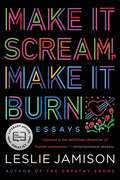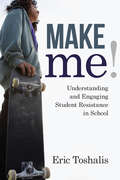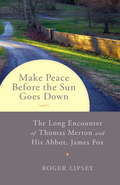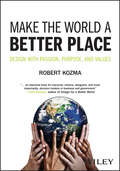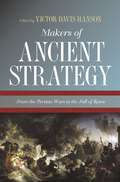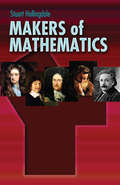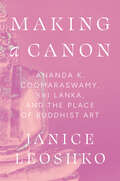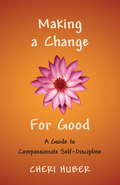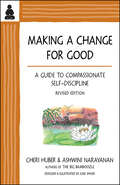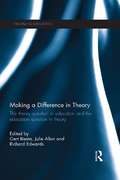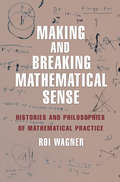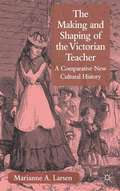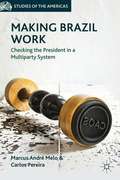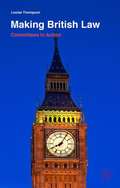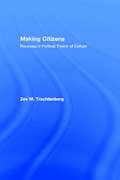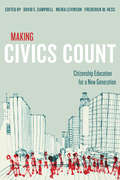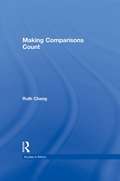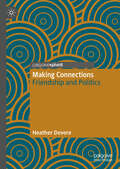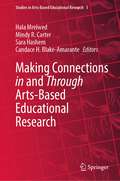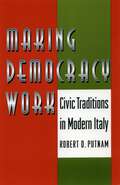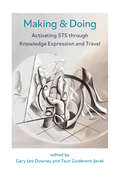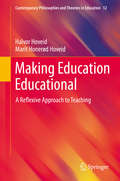- Table View
- List View
Make It Scream, Make It Burn: Essays
by Leslie JamisonFrom the "astounding" (Entertainment Weekly), "spectacularly evocative" (The Atlantic), and "brilliant" (Los Angeles Times) author of the New York Times bestsellers The Recovering and The Empathy Exams comes a return to the essay form in this expansive new book. <P><P>ONE OF THE FALL'S MOST ANTICIPATED BOOKS: Time, Entertainment Weekly, O, Oprah Magazine, Boston Globe, Newsweek, Esquire, Seattle Times, Baltimore Sun, BuzzFeed, BookPage, The Millions, Marie Claire, Good Housekeeping, Minneapolis Star Tribune, Lit Hub, Women's Day, AV Club, Nylon, Bustle, Goop, Goodreads, Book Riot, Yahoo! Lifestyle, Pacific Standard, The Week, and Romper. <P><P>With the virtuosic synthesis of memoir, criticism, and journalism for which Leslie Jamison has been so widely acclaimed, the fourteen essays in Make It Scream, Make It Burn explore the oceanic depths of longing and the reverberations of obsession. <P><P>Among Jamison's subjects are 52 Blue, deemed "the loneliest whale in the world"; the eerie past-life memories of children; the devoted citizens of an online world called Second Life; the haunted landscape of the Sri Lankan Civil War; and an entire museum dedicated to the relics of broken relationships. <P><P>Jamison follows these examinations to more personal reckonings -- with elusive men and ruptured romances, with marriage and maternity -- in essays about eloping in Las Vegas, becoming a stepmother, and giving birth. <P><P>Often compared to Joan Didion and Susan Sontag, and widely considered one of the defining voices of her generation, Jamison interrogates her own life with the same nuance and rigor she brings to her subjects. The result is a provocative reminder of the joy and sustenance that can be found in the unlikeliest of circumstances.
Make Me!: Understanding and Engaging Student Resistance in School
by Eric ToshalisIn this groundbreaking book, Eric Toshalis explores student resistance through a variety of perspectives, arguing that oppositional behaviors can be not only instructive but productive. All too often treated as a matter of compliance, student resistance can also be understood as a form of engagement, as young people confront and negotiate new identities in the classroom environment. The focus of teachers' efforts, Toshalis says, should not be about "managing" adolescents but about learning how to read their behavior and respond to it in developmentally productive, culturally responsive, and democratically enriching ways. Noting that the research literature is scattered across fields, Toshalis draws on four domains of inquiry: theoretical, psychological, political, and pedagogical. The result is a resource that can help teachers address this pervasive classroom challenge in ways that enhance student agency, motivation, engagement, and academic achievement. The coauthor of Understanding Youth: Adolescent Development for Educators (Harvard Education Press, 2006), Toshalis blends accessible explanations of theory and research with vignettes of interactions among educators and students. In Make Me!, Toshalis helps teachers perceive possibility, rather than pathology, in student resistance. "With poignance and skill, Toshalis shepherds educators away from yearning for prescriptive classroom management heuristics to spaces where they embrace the 'remaking' of themselves in their journey to serve, build, and respond to the humanity of students.Make Me! is a pre-service and in-service teacher education gem that will surely improve the way classroom management is taught, understood, operationalized, and practiced." --H. Richard Milner IV, Helen Faison Endowed Chair of Urban Education, University of Pittsburgh
Make Peace before the Sun Goes Down: The Long Encounter of Thomas Merton and His Abbot, James Fox
by Roger LipseyIn the 1950s and '60s, Thomas Merton, a monk of the Trappist monastery of Gethsemani in Kentucky, published a string of books that are among the most influential spiritual books of the twentieth century--including the mega-best seller The Seven-Storey Mountain. He was something of a rock star for a cloistered monk, and from his monastic cell he enjoyed a wide and lively correspondence with people from the worlds of religion, literature, and politics. During that period he also explored and wrote extensively on Buddhism, Sufism, art, and social action. The man to whom he owed obedience in the cloistered life was a much more traditional Catholic, his abbot, Dom James Fox. To say that these two men had a conflicted relationship would be an understatement, but the tension their differences in orientation brought actually led to creative results on both sides and to a kind of hard-won respect and love. Roger Lipsey's portrait of this unusual relationship is compelling and moving; it shows Merton in the years his imagination was taking him far beyond the walls of the monastery, and eventually, literally to Asia.
Make the World a Better Place: Design with Passion, Purpose, and Values
by Robert KozmaMAKE THE WORLD A BETTER PLACE “This book is a must read for all with an interest in the future of design.” —Jim Spohrer, PhD, Retired Industry executive, International Society of Service Innovation Professionals “The world is in need of better design, and Kozma’s book shows us how to get there.” —Mark Guzdial, Director, Program in Computing for the Arts and Sciences, College of Literature, Science, and the Arts, Professor of Electrical Engineering and Computer Science, College of Engineering, University of Michigan Design services, products, experiences, and places that transform the world for the better Make the World a Better Place: Design with Passion, Purpose, and Values presents an insightful and hands-on discussion of design as a profoundly human activity and challenges us all to use design to transform the world for the better. The book explains how and why the design industry lost its way, and how to re-ignite the idealism that once made it a force for good. Make the World a Better Place describes a set of moral principles, based on our shared humanity, that can be used to create “good” designs: designs that reduce harm, increase well-being, advance knowledge, promote equality, address injustice, and build supportive, compassionate relationships and communities. Dr. Kozma applies philosophy, psychology, sociology, and history to the world of design, including: Examples and case studies of designs—both good and bad Seven principles of good design, based on the impact designs have on people An approach to design as a “moral dialog among co-creators,” in which the seven principles can be applied to intentionally improve the world Comprehensive explorations of a person-resource-activity model that explains how technology shapes designs Detailed analyses of the strengths and pitfalls of five design traditions, which include the scientific, technical-analytic, human-centered, aesthetic, and social movement traditions
Makers of Ancient Strategy: From the Persian Wars to the Fall of Rome
by Victor Davis HansonTimeless lessons from the military strategies of the ancient Greeks and RomansIn this prequel to the now-classic Makers of Modern Strategy, Victor Davis Hanson, a leading scholar of ancient military history, gathers prominent thinkers to explore key facets of warfare, strategy, and foreign policy in the Greco-Roman world. From the Persian Wars to the final defense of the Roman Empire, Makers of Ancient Strategy demonstrates that the military thinking and policies of the ancient Greeks and Romans remain surprisingly relevant for understanding conflict in the modern world.The book reveals that much of the organized violence witnessed today—such as counterterrorism, urban fighting, insurgencies, preemptive war, and ethnic cleansing—has ample precedent in the classical era. The book examines the preemption and unilateralism used to instill democracy during Epaminondas's great invasion of the Peloponnesus in 369 BC, as well as the counterinsurgency and terrorism that characterized Rome's battles with insurgents such as Spartacus, Mithridates, and the Cilician pirates. The collection looks at the urban warfare that became increasingly common as more battles were fought within city walls, and follows the careful tactical strategies of statesmen as diverse as Pericles, Demosthenes, Alexander, Pyrrhus, Caesar, and Augustus. Makers of Ancient Strategy shows how Greco-Roman history sheds light on wars of every age. In addition to the editor, the contributors are David L. Berkey, Adrian Goldsworthy, Peter J. Heather, Tom Holland, Donald Kagan, John W. I. Lee, Susan Mattern, Barry Strauss, and Ian Worthington.
Makers of Mathematics
by Stuart HollingdaleFascinating and highly readable, this book recounts the history of mathematics as revealed in the lives and writings of the most distinguished practitioners of the art: Archimedes, Descartes, Fermat, Pascal, Newton, Leibniz, Euler, Gauss, Hamilton, Einstein, and many more. Author Stuart Hollingdale introduces and explains the roles of these gifted and often colorful figures in the development of mathematics as well as the ways in which their work relates to mathematics as a whole.Although the emphasis in this absorbing survey is primarily biographical, Hollingdale also discusses major historical themes and explains new ideas and techniques. No specialized mathematical knowledge on the part of the reader is assumed. Superbly informative, this volume offers an accessible, interesting guide to one of the pillars of modern science, and to a supremely important aspect of human culture through the ages.
Making a Canon: Ananda K. Coomaraswamy, Sri Lanka, and the Place of Buddhist Art (Buddhism and Modernity)
by Janice LeoshkoThe story of how one scholar’s experiences in Sri Lanka shaped the contours of the Buddhist visual canon. An early interpreter of Buddhist art to the West, Ananda Kentish Coomaraswamy laid the foundation of what would become the South Asian visual canon, particularly through his efforts to understand how Buddhist art emerged and developed. In Making a Canon, Janice Leoshko examines how Coomaraswamy’s experience as the director of a mineralogical survey in Sri Lanka shaped his understanding of South Asian art and religion. Along the way, she reveals how Coomaraswamy’s distinctive repetition of Sri Lankan visual images in his work influenced the direction of South Asia’s canon formation and left a lasting impression on our understanding of Buddhist art.
Making a Change for Good: A Guide to Compassionate Self-Discipline
by Cheri HuberAccording to Zen teacher Cheri Huber, we are conditioned to think that if we were only a little better in some way, we would be happy: "Life isn't the way it should be and it's my fault!" But, Huber says, no amount of self-punishment will ever make us happy or bring us control over life's problems. The help we are looking for is really found in self-acceptance and kindness toward ourselves. By simply allowing ourselves to be guided by our innate intelligence and generosity, which are our authentic nature, we are able to be compassionately present to what's happening now. Compassionate self-discipline--the will to take positive steps in life--is found through nothing other than being present. When we are present and aware, we are not engaged in distracting, addictive behaviors. If we simply cultivate our ability to pay attention and focus on what is here in this moment, our experience can be authentic, awake, honest, and joyful.The book includes a guided thirty-day program of daily meditation, contemplation, and journaling.For more information on the author, Cheri Huber, visit her website at www.cherihuber.com.
Making a Change for Good: A Guide to Compassionate Self-Discipline, Revised Edition
by Ashwini Narayanan Cheri HuberMaking a Change for Good will assist anyone to make a change of any kind, whatever the area— diet, fitness, stress, addictions, unskillful behaviors, anxiety, finances, spiritual practice... . Kind, compassionate encouragement for confronting personal issues head on and supportive tools for addressing the struggle are the differences in approach this book offers. Readers realize that lack clarity is the hindrance to addressing an issue, not lack of self-discipline. Rather than being caught in self-hating and self-blaming loops that veer us off course, we can learn to mentor ourselves, and this book teaches us how. The 30-day retreat at the end of the book provides a structure for practicing compassionate self-discipline.
Making a Difference in Theory: The Theory Question In Education And The Education Question In Theory (Theorizing Education Series)
by Julie Allan Richard Edwards Gert BiestaMaking a Difference in Theory brings together original work from an international group of authors on the roles of theory in educational research and practice. The book discusses the different roles theory plays, can play and should play, both from a historical perspective and in light of contemporary discussions and developments. <P><P> Particular attention is paid to the question of whether there are or should be distinctively educational forms of theory and theorising. The double engagement with the theory question in education and the education question in theory and theorising provides original insights in what theory does, might do or should do in educational research and practice. <P><P> With contributions from internationally renowned authors in the field of educational theory, research and practice, the book will be of value to academics, researchers and postgraduate students in education.
Making a Stand for Animals
by Oscar HortaEngaging and thought-provoking, this book examines how humans see and treat other animals and argues that we should extend equal consideration and respect to all beings, human and nonhuman alike. Our world is plighted by ‘isms’ such as racism and sexism, but we may have overlooked a very important one: speciesism. Speciesism is a form of discrimination against those who don’t belong to a certain species. It drives us to see nonhuman animals as objects, rather than individuals with their own interests and with the ability to feel and suffer. This book questions all of the assumptions speciesism is based upon. It raises many challenging questions over humans' very complicated attitudes toward other animals. Thinking about how animals are used as well as the suffering of wild animals, and what the future may be for all beings, this book calls for society to seriously take into account the interests of all animals. For all who care about animals, or simply how to make the world a better place, this book is essential reading.
Making and Breaking Mathematical Sense: Histories and Philosophies of Mathematical Practice
by Roi WagnerIn line with the emerging field of philosophy of mathematical practice, this book pushes the philosophy of mathematics away from questions about the reality and truth of mathematical entities and statements and toward a focus on what mathematicians actually do—and how that evolves and changes over time. How do new mathematical entities come to be? What internal, natural, cognitive, and social constraints shape mathematical cultures? How do mathematical signs form and reform their meanings? How can we model the cognitive processes at play in mathematical evolution? And how does mathematics tie together ideas, reality, and applications?Roi Wagner uniquely combines philosophical, historical, and cognitive studies to paint a fully rounded image of mathematics not as an absolute ideal but as a human endeavor that takes shape in specific social and institutional contexts. The book builds on ancient, medieval, and modern case studies to confront philosophical reconstructions and cutting-edge cognitive theories. It focuses on the contingent semiotic and interpretive dimensions of mathematical practice, rather than on mathematics’ claim to universal or fundamental truths, in order to explore not only what mathematics is, but also what it could be. Along the way, Wagner challenges conventional views that mathematical signs represent fixed, ideal entities; that mathematical cognition is a rigid transfer of inferences between formal domains; and that mathematics’ exceptional consensus is due to the subject’s underlying reality.The result is a revisionist account of mathematical philosophy that will interest mathematicians, philosophers, and historians of science alike.
The Making and Shaping of the Victorian Teacher
by Marianne A. LarsenProviding comparative and international contexts to understand the history of the making of the teacher in Victorian England, this is a compelling account of the development during this time of teacher training, inspections and certification - reforms which shaped the good teacher as a modern and moral individual.
Making Brazil Work
by Marcus André Melo Carlos PereiraThis book offers the first conceptually rigorous analysis of the political and institutional underpinnings of Brazil's recent rise. Using Brazil as a case study in multiparty presidentialism, the authors argue that Brazil's success stems from the combination of a constitutionally strong president and a robust system of checks and balances.
Making British Law: Committees in Action
by Louise ThompsonLaws are essential to the lives of all British citizens and crucial to the survival of British Governments. This book follows the work of House of Commons bill committees as they scrutinise legislation and reveals the hidden depths of law making in the British Parliament.
Making Citizens: Rousseau's Political Theory of Culture
by Zev M. TrachtenbergBy analysing Rousseau's conception of the general will, Zev Trachtenberg characterises the attitude of civic virtue Rousseau believes individuals must have to cooperate successfully in society. Rousseau holds that culture affects political life by either fostering or discouraging civic virtue. However, while the cultural institutions Rousseau endorses would motivate citizens to obey the law, they would not prepare citizens to help frame it. Rousseau's view of culture thus works against his account of legitimacy, and Trachtenberg concludes that Rousseau's political theory as a whole is inconsistent.
Making Civics Count: Citizenship Education for a New Generation
by David E. Campbell"By nearly every measure, Americans are less engaged in their communities and political activity than generations past.&” So write the editors of this volume, who survey the current practices and history of citizenship education in the United States. They argue that the current period of &“creative destruction&”—when schools are closing and opening in response to reform mandates—is an ideal time to take an in-depth look at how successful strategies and programs promote civic education and good citizenship.Making Civics Count offers research-based insights into what diverse students and teachers know and do as civic actors, and proposes a blueprint for civic education for a new generation that is both practical and visionary.
Making Civics Count: Citizenship Education for a New Generation
by Meira Levinson David E. Campbell Frederick M. Hess"By nearly every measure, Americans are less engaged in their communities and political activity than generations past." So write the editors of this volume, who survey the current practices and history of citizenship education in the United States. They argue that the current period of "creative destruction"--when schools are closing and opening in response to reform mandates--is an ideal time to take an in-depth look at how successful strategies and programs promote civic education and good citizenship.Making Civics Count offers research-based insights into what diverse students and teachers know and do as civic actors, and proposes a blueprint for civic education for a new generation that is both practical and visionary.
Making Comparisons Count (Studies in Ethics)
by Ruth ChangThis book attempts to answer two questions: Are alternatives for choice ever incomparable? and In what ways can items be compared? The arguments offered suggest that alternatives for choice no matter how different are never incomparable, and that the ways in which items can be compared are richer and more varied than commonly supposed.
Making Connections: Friendship and Politics
by Heather DevereThis book is a historical review of literature and ideas that make the connections between friendship and politics. Using pertinent quotations from a wide variety of sources, the book is divided into three main parts. Firstly, it explores interpretations of the concept of friendship, tracing its use from the Ancient Greek and Roman philosophical works, through to modern and postmodern perspectives, touching on different cultural, religious, and ethical connections. Secondly, the concept of the political is identified according to different aspects and ideological emphases, looking at influences in different time periods, and demonstrating the importance of relational politics as viewed through feminism, identity, culture, globalism, and the ethics of care. The third part draws together the political and friendship highlighting the importance of relational politics and civic friendship as a topic relevant for academic consideration of politics.
Making Connections in and Through Arts-Based Educational Research (Studies in Arts-Based Educational Research #5)
by Hala Mreiwed Mindy R. Carter Sara Hashem Candace H. Blake-AmaranteThis book explores the connections made in and through arts-based educational research through four themes: socially engaged connections, cultural connections, personal and pedagogical connections, and making connections during the COVID-19 pandemic. It emerges from the 3rd bi-annual 2020 Artful Inquiry Research Group symposium on the theme of “connections”. The symposium brought together artists, community members, teachers, students, and researchers through a virtual platform to examine the way(s) in which the arts can help connect people, ideas, and spaces/places in a pandemic reality. Art plays a predominant role in each chapter as authors weave their research and art-based understandings together. This book is a valuable teaching resource for undergraduate and postgraduate courses in teaching, anthropology, digital ethnography, autoethnography, cultural studies, and communications. It is of interest to higher education students, academic researchers, and teachers exploring arts-based methodologies in the fields of creative practice and creativity studies, communications, critical studies, sociology, sciences, teacher education, and the arts.
Making Constitutions
by Gabriel L. NegrettoNegretto provides the first systematic explanation of the origins of constitutional designs from an analytical, historical and comparative perspective. Based on analysis of constitutional change in Latin America from 1900 to 2008 and four detailed case studies, Negretto shows the main determinants of constitutional choice are the past performance of constitutions in providing effective and legitimate instruments of government and the strategic interests of the actors who have influence over institutional selection. The book explains how governance problems shape the general guidelines for reform, while strategic calculations and power resources affect the selection of specific alternatives of design. It emphasizes the importance of events that trigger reform and the designers' level of electoral uncertainty for understanding the relative impact of short-term partisan interests on constitution writing. Negretto's study challenges predominant theories of institutional choice and paves the way for the development of a new research agenda on institutional change.
Making Democracy Work: Civic Traditions in Modern Italy
by Robert D. Putnam Robert Leonardi Raffaella Y. NanettiWhy do some democratic governments succeed and others fail? In a book that has received attention from policymakers and civic activists in America and around the world, Robert Putnam and his collaborators offer empirical evidence for the importance of "civic community" in developing successful institutions. Their focus is on a unique experiment begun in 1970 when Italy created new governments for each of its regions. After spending two decades analyzing the efficacy of these governments in such fields as agriculture, housing, and health services, they reveal patterns of associationism, trust, and cooperation that facilitate good governance and economic prosperity.
Making & Doing: Activating STS through Knowledge Expression and Travel
by Gary Lee Downey and Teun Zuiderent-JerakHow ten making & doing projects expand STS scholarship through a focus on knowledge expression and knowledge travel in addition to knowledge production.Making & doing projects expand STS scholarship to include the trajectories of STS knowledge flow beyond the boundaries of the field by actively interweaving knowledge expression and travel with knowledge production. In this edited volume, contributors from around the world present and critically assess ten empirical making & doing projects. They recount how their projects advance STS, and describe how they themselves learn from their interlocutors and the settings in which they do and share their STS work. A coda explains how the infrastructures of STS scholarship are broadening to include practices of making & doing. The contributors examine and reflect upon their dilemmas, frustrations, and failures, especially when these generate new practices that might not have occurred had their work not taken the form of making and doing scholarship. While each project raises a distinct set of scholarly issues, all of the projects include practices that express STS knowledge through &“STS sensibilities&” and attach those sensibilities to practices in empirical fields. The ten projects include one each in Argentina, Taiwan, Canada, and Denmark; two in the US; one in Austria, the UK, and multiple countries in Africa and Asia; one in the US and Latin America; one in the Netherlands and Australia; and one in an international network that includes members from Europe, the Americas, and Australia.
Making Education Educational: A Reflexive Approach to Teaching (Contemporary Philosophies and Theories in Education #12)
by Halvor Hoveid Marit Honerød HoveidThis book is an argument for reflexivity in the act of teaching, which means to acknowledge that intention guides the act of teaching. Teaching must create attention towards processes of collectivity in the classroom. Today, teaching is both acts of expressing knowledge and acts of securing justice to all students through a mediation of knowledge. Teaching therefore expresses both knowledge with reference to school subjects, and justice according to the distribution of this knowledge.The authors argue for teaching as the driver of education. To pay attention to teaching is to pay attention to that which is inside the system of education. To consider education as a mediation of knowledge between generations, places teaching as an act of performing the content of education, in a class in a school. The complexity of these processes is easily overlooked when education is used as a means in competitive economies. The approach taken in this text is that deliberations about teaching must be based on historicity. The support for this argument builds on a reading of the French philosopher Paul Ricoeur.The book addresses teaching as an integral part of the learning process. In education today, everything seems to be concentrated around learning, as if teaching no longer takes place. Teachers and teacher educators need a language to discuss and understand teaching, both as personal and institutional actions. A Ricoeurian approach to a discussion on teaching as a reflexive and institutional practice, provides a timely approach to important questions related to teaching in our day and age.
